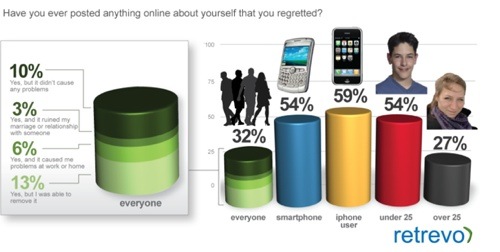Have you ever posted something that came back to bite you, like extreme political views, racy pictures, or complaints about your boss? If you did, you’re not alone, and until now, foolish posts were all your own and only viewed by friends in your social media network and maybe the random high school classmate you decided to friend , the one you barely remember.
But what if everyone could see these blunders and more? What if your profile and interests were broadcast to a wider audience.
As you know, recent changes to Facebook’s default privacy settings are slipping user’s profile info to search engines, and newly proposed features are stirring up controversy in Congress as well as creating privacy concerns amongst users. Research by Retrevo (http://www.retrevo.com) earlier this year suggests that people were already getting themselves into trouble by hastily posting content that they find themselves regretting later. Facebook’s new privacy settings aren’t going to help.
It’s tempting to let the moment motivate a post that clearly steps outside the boundaries of good judgment. And it should be said that some things are better left unsaid or to be discussed in the privacy of your own home minus the computer that resides there. However, hasty posting is more common than you might think. In fact, over 1/3 of our respondents admitted to having poster’s remorse and iPhone users rank slightly higher than other smartphone owners. Are smartphones making it too easy for people to embarrass themselves?
“We live in a digital age where everything is expected to be public and instant,” says Manish Rathi, Retrevo co-founder and vice president of marketing. “Whether it’s pictures from your kid’s birthday party, or your perspectives on political events, people are sharing their thoughts faster, and with a wider audience than ever before. Look at trending topics on social media sites like Twitter and you’ll find people sharing their opinions on everything from the Gulf Cost oil spill to Justin Bieber. Given the urgency and frequency with which people are expected to share, it’s no wonder some postings might later be regretted.”
Then there’s the aftermath. Nearly one-third of those who regretted their post say it ruined their marriage or relationship with someone or caused problems at home or work. Then there’s the question of age, seeing that more respondents under 25 fell victim to their own regretful posts compared to their over-25-year-old counterparts.
Making technology mobile certainly creates more opportunity to post on social media sites like Facebook, Twitter, and MySpace. Interestingly enough, Retrevo found that over 1/3 of their irespondents admit to using their iPhone or smartphone as a computer substitute. Maybe people wouldn’t post as much if they only did it at home in front of a “real” computer.
It would be easy to lay the blame on the gadgets and skirt responsibility from the user, but as gadget enthusiasts, we’re unlikely to do that. The reality is that when it comes to removing your shotgun post that will more than likely cause you major headaches, breakups, or even job loss, these same mobile devices and computers also let you remove your posts just as easily. Almost half of those who said “yes” to regretting their posts, said they were able to remove it, thus proving that technology can save more than your data.
The Retrevo Gadgetology Report is an ongoing study of people and electronics from the consumer electronics shopping and review site Retrevo.com. The data for this report came from a study of online individuals conducted by an independent panel. The sample size was over 1,000 distributed across gender, age, income and location in the United States. Most responses have a confidence interval of 4% at a 95% confidence level.

